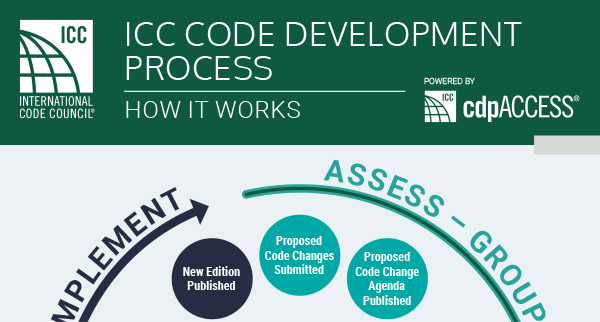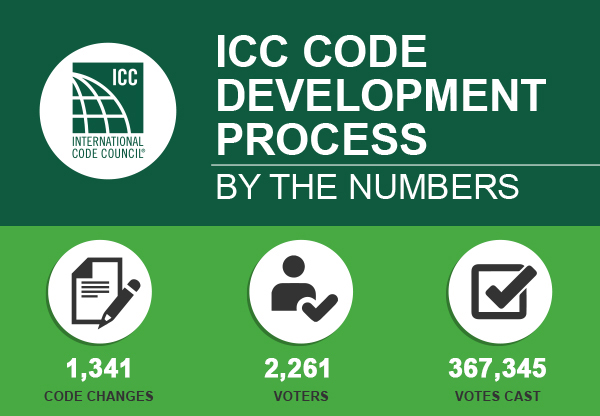
The Code Development Process
Imagine a world where you can shape the regulations that ensure the health, safety and welfare of the people who live in, work in and visit the community you serve. You don't have to.
The International Code Council develops construction and public safety codes through a governmental consensus process. This system of code development has provided the highest level of safety in the world for more than 90 years.
Important Links
The Code Council governmental consensus process meets the principles defined by the National Standards Strategy of 2000, and the OMB Circular A-119, Federal Participation in the Development and Use of Voluntary Consensus Standards and in Conformity Assessment Activities (1998). It complies with Public Law 104-113 National Technology Transfer and Advancement Act of 1995.
Click below to download our brochure to learn more.
The following principles are adhered to in the Code Council's governmental consensus process.
Openness
- Participation in the development of the codes, including code hearings, is open to all at no cost.
- Anyone can submit a code change proposal or make a public comment.
- Code committees must consider all views before voting.
Transparency
- Evidence of committee vote, with reason, must be documented.
- Final decisions are made in an open hearing by public safety officials.
Balance of Interest
- Committee members represent general interests, user interests, producer interests, or multiple interests. One-third of the committee’s members must be public safety officials.
- Committee members cannot vote on issues that are a conflict of interest.
- ICC membership is not a condition of committee membership.
Due Process
- A code change proponent has the opportunity to rebut opponents and vice versa.
- Anyone who attends the hearing can testify.
- Committees are required to consider all views, objections and the cost impact of all code change proposals.
Appeals Process
- Anyone can appeal an action or inaction of the code committee.
- ICC renders its decision on the appeal based on whether due process was served.
Consensus
- Committee members vote to approve the code change, make modifications to it, or vote against it.
- A simple majority from the committee decides the action of the proposed code change.
Code Development Procedures
- Introduction to the Code Council's Regulatory Publications and Support Documents
- Corporate Governance (bylaws, procedures and council policies)
- Council Policy on Code Development
- Code Council Code Development Process
- Board Committee On Long-Term Code Development Process
- Link to cdpACCESS
- ICC Code Development Process (Powerpoint)
For more information on the Code Development Process,
contact Russ Manning, SVP, Technical Services.


 (Click to download a
(Click to download a 
